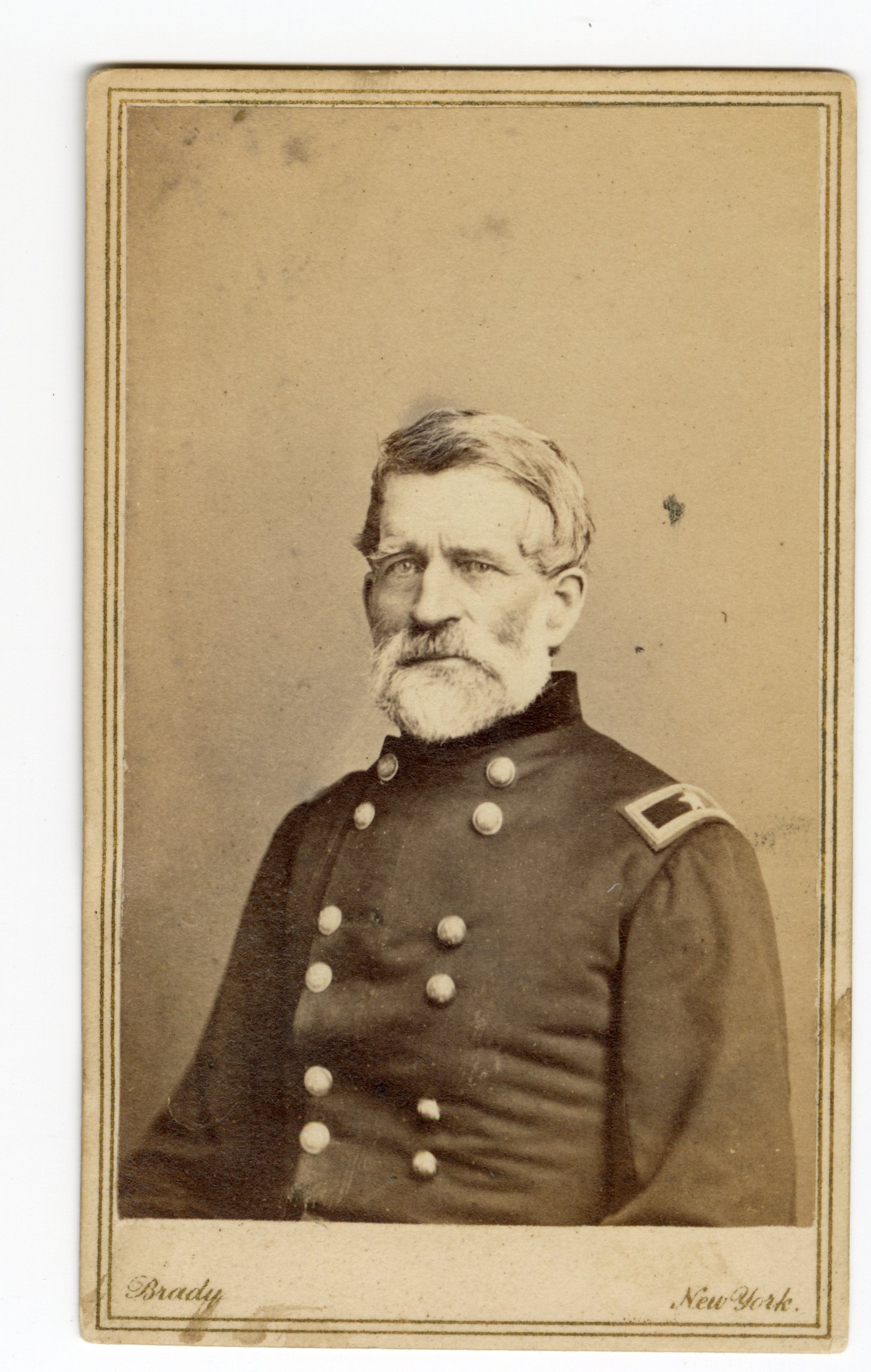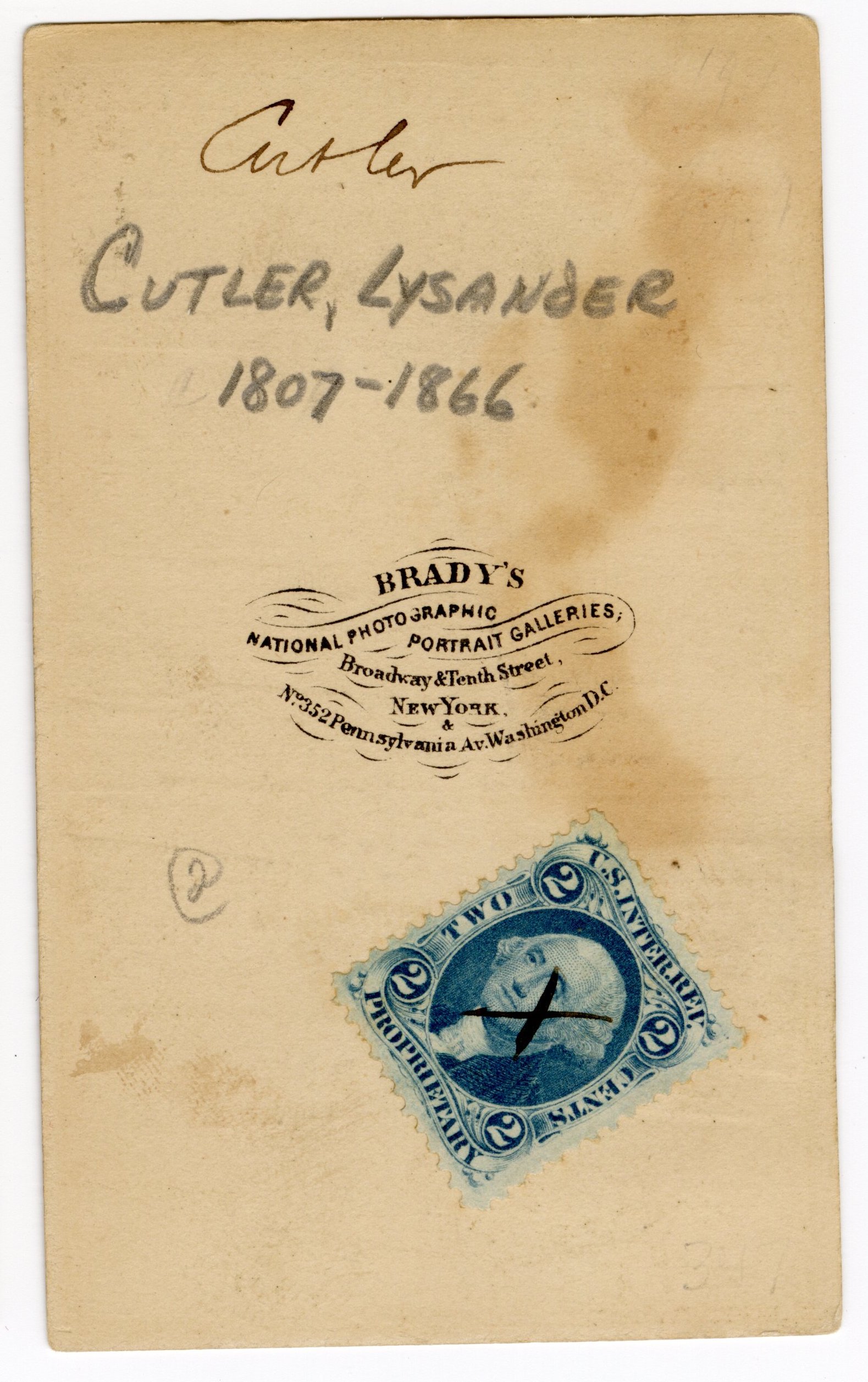6th Wisconsin Infantry - Iron Brigade - Gettysburg Brigade Commander
Item CDV-10831
Lysander Cutler
Price: $1200.00
Description
Lysander Cutler (February 16, 1807 – July 30, 1866) was an American businessman, educator, politician, and Wisconsin pioneer. He served as a Union Army officer through almost the entire American Civil War, notably commanding the famed Iron Brigade of the Army of the Potomac. He rose to the rank of brigadier general and received an honorary brevet to major general. Earlier in his career, he was a member of the Maine Senate.In the first summer of the Civil War, Cutler, a respected 54-year-old businessman and Indian-fighter, was commissioned colonel of the 6th Wisconsin Infantry on July 16, 1861. This regiment would eventually become one of the units to comprise the famous Iron Brigade of the Army of the Potomac.
During the fall and winter, he got off to a bad start as a commander, alienating his junior officers by insisting that they pass examinations on military topics, and removing them from command if he was displeased with the results. Many men of the regiment were of recent immigrant status and he sometimes enraged the enlisted men of the company by replacing their officers with men of different national backgrounds, and sometimes speaking different languages. Despite these problems, Cutler was elevated to temporary brigade command in the I Corps of the Army of the Potomac on March 13, 1862.
Cutler's men rejoiced when this temporary position was filled by Brig. Gen. John Gibbon that summer. The regiment's first significant action was the Second Battle of Bull Run, where he demonstrated that he was a tenacious fighter. One soldier in his regiment said that he was "rugged as a wolf." During the fighting againstS Jackson at Brawner's Farm, Cutler was severely wounded in the right thigh, causing him to miss the Maryland Campaign and the Battle of Antietam of September 1862.
When Gen. Gibbon was promoted to division command, he recommended that the recuperating Cutler be given command of the Iron Brigade, but Col. Solomon Meredith of the 19th Indiana had better political connections and received the appointment, dismaying Cutler. During the Battle of Fredericksburg in December, division commander Maj. Gen. Abner Doubleday placed Cutler in temporary command of the Iron Brigade for a few hours, dissatisfied with what he considered tardy execution of orders by Col. Meredith. After the battle, Cutler was promoted to brigadier general, to rank from November 29, 1862.
In the spring of 1863, Cutler was given command of the 2nd Brigade, James S. Wadsworth's 1st Division, I Corps, which he led at the Battle of Chancellorsville in May, but his unit was only lightly engaged. In the Battle of Gettysburg, they were heavily engaged north of the Chambersburg Pike, (76th New York, 147th New York, and 56th Pennsylvania) withstanding multiple Confederate assaults from the divisions of Maj. Gens. Henry Heth and Robert E. Rodes, coming in from the west and north, respectively.
The brigade itself had been split earlier by Maj. Gen. John Reynolds, with a demi-brigade (14th Brooklyn and 95th New York), under the command of Colonel Fowler of the 14th Brooklyn, to engage Brig. Gen. James Archer's brigade south of the Chambersburg Pike. By the time the I Corps line broke around 4 p.m., his brigade had suffered over 50% casualties.
During the frantic retreat through the town of Gettysburg, Cutler had two horses shot out from under him. For the remainder of the three-day battle, Cutler's brigade occupied defensive positions on Culp's Hill and, taking advantage of the entrenchments there, suffered few additional casualties.
The Army of the Potomac was reorganized in the spring of 1864 and Cutler was given command of the 1st Brigade, 4th Division, V Corps, on March 25. After Gen. Wadsworth was mortally wounded at the Battle of the Wilderness, Cutler assumed command of the 4th Division on May 6. He led the division through the rest of the Overland Campaign and into the Siege of Petersburg.
At the Battle of Globe Tavern on August 21, 1864, he was struck in the face and badly disfigured by a shell fragment and he was forced to leave field command. He spent the remainder of the war as an invalid, administering the draft in Jackson, Michigan. On December 12, 1864, President Abraham Lincoln nominated Cutler for appointment to the grade of brevet major general to rank from August 19, 1864, and the U.S. Senate confirmed the nomination on February 14, 1865.
Cutler resigned from the Army on June 30, 1865, his health deteriorating rapidly.
Source: Wikipedia


